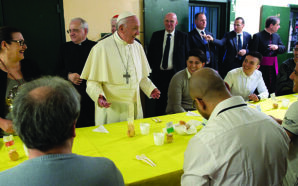I came to Ideas to Save your Life with some ambivalence. The table of contents lists twenty chapters, each dedicated to a philosopher or two. It was the philosophy in bulk that I felt ambivalent about. I was taught scholastic philosophy for three years. I derived some benefit from the discipline which offered a worldview on which Catholic theology could be built. I had no difficulty in believing that the comprehensive system we were taught was true and that those who differed from it were wrong. My problem was that I did not see that I would ever be able to persuade anyone outside the Scholastic club of its truth. Philosophy had given me lots of answers but no feel for the questions to which they might be an answer.
When teaching theology later I recognised that I was less interested in the logical consistency of different accounts of faith than in why people found them convincing. This had more to do to do with the way they imagined the world than with the force of discursive argument. Underlying all powerful philosophies and theologies lay a strong and compelling metaphor. In my case beyond the arguments and the metaphors lay the mystery of a world and of human life which, because they originate in love, are too big to understand but not too large to love.
My ambivalence about professional philosophy came from my placing a high value on reason and its desire to test its own limits, but simultaneously being inherently suspicious of reasons. They are the stuff out of which the tin-soldiers of isms are created and so often used to patrol the fence that separates acceptable from unacceptable thought. Michael McGirr’s previous writing, however, inspired confidence. His natural instinct on finding a fence is always to find a gap through which to sneak, not to put barbed wire on top of it to prevent people from trespassing.
Ideas to Save Your Life focuses less on the reason-giving of the philosophers on whose work it draws than on the questions that feed their thinking and the metaphors that underlie its structure. Their questions are not asked out of curiosity but are existential questions that trouble and excite them. They arise from exigent experience of their people’s lives and world. Although their reasoning in response to these questions about the good life may be cool and abstract, the urgency of their enquiry and its implications for other human beings is high.
In this kind of enquiry philosophy is a dialogue in which people’s existential questions are met with similar questions. In each chapter McGirr begins with incidents and encounters in his own life that evoked these large questions. They include especially encounters with his secondary school students which raised large questions about the meaning of life. These stories then lead him to reflect on the way different philosophers respond to a related existential question. The philosophers are seen neither as authorities whose conclusions are automatically to be accepted nor as adversaries whose appointed fate is to be routed by a true philosophy, but as fellow walkers, strugglers, meaning seekers whose ideas are partial but are worthy of respect. The humorous and passionate style of the book expresses this sense of being fallible companions in a shared enterprise.
The range of philosophers mentioned is a tribute to McGirr’s reading and human sympathy. Although they include accepted landmarks in the history of philosophy like Plato, Aristotle and Wittgenstein, they omit many of the system makers like Aquinas, Hume, Kant and Hegel in favour of such relatively minor figures as Margaret Cavendish, Henry Thoreau, William James and Martha Nussbaum. I was delighted to see Canberra philosopher Frank Jackson represented in the collection.
McGirr is most engaging when introducing thinkers who in their lifetime were often dismissed as eccentric or subversive. Among them are Cavendish, Kierkegaard, Nietzsche, Simone Weil and Alan Turing. The oddities of their behaviour and the wildness of their language can conceal their seriousness in commending an understanding of human life that transcends self-satisfied blandness. The book endorses their quest.
McGirr draws on their questions and ideas when facing in his school community the refusal or inability to recognise the importance of large and troubling questions about life and its meaning. For him, young people are short changed when they are encouraged to assume that a life measured by individual satisfaction, security, career, wealth and status is a good life. In his accompaniment of students in the classroom, in times of crisis and in their meetings with people who are homeless or in great poverty in Melbourne or in Africa McGirr, like Socrates in Athens, is clearly an extraordinary gift to any institution in which he teaches.
The book concludes with a bow to Descartes, a system maker denied a chapter to himself. Its final section is entitled, I Think, Therefore I Thank. The title does more than decorate the courtesy or duty to acknowledge people. The life that McGirr commends is one that risks insecurity, is sensitive to one’s fragility and fallibility, compassionate to other human beings, and full of wonder at a beautiful and death-marked world. The natural response to such a world is one of gratitude.
In my philosophical studies the most discussed topic was whether the proofs offered for the existence of God held water. The argument I find most persuasive is that God must exist because we need someone to thank. As a reason it is as full of holes as a much-loved woolly jumper in a nest of moths. But as a response of reason to an existential question it hangs lightly in the air where, I suspect, Michael McGirr would like his readers to stay as they read his book.
Ideas to Save your Life can be purchased from Text Publishing.
Andrew Hamilton is consulting editor of Eureka Street, and writer at Jesuit Social Services.
This article was originally published on Eureka Street, a publication of the Australian Jesuits. Reproduced with permission.









